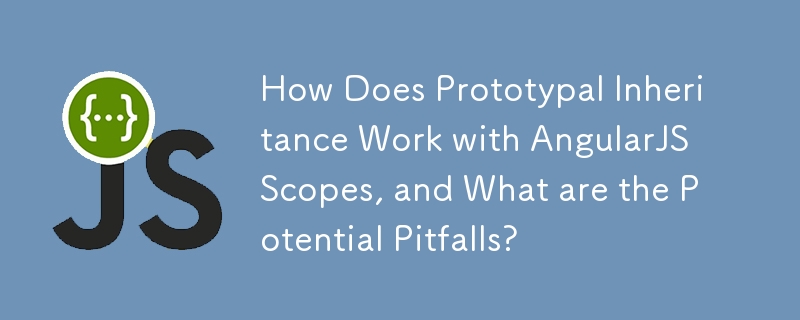Home >Web Front-end >JS Tutorial >How Does Prototypal Inheritance Work with AngularJS Scopes, and What are the Potential Pitfalls?
How Does Prototypal Inheritance Work with AngularJS Scopes, and What are the Potential Pitfalls?
- Susan SarandonOriginal
- 2024-12-26 14:32:11500browse

What are the nuances of scope prototypal / prototypical inheritance in AngularJS?
Prototypal Inheritance Review
Prototypal inheritance is a mechanism in JavaScript where objects can inherit properties and methods from other objects. This is achieved through the prototype chain.
AngularJS Scope Inheritance
AngularJS scopes can prototypically inherit properties and methods from their parent scopes. However, there are a few exceptions to this rule:
- Directives with scope: {...}: These create an "isolate" scope that does not prototypically inherit. This is often used to create reusable components.
-
2-Way Data Binding Exceptions:
- Primitives: When binding to a primitive (string, number, boolean) in the parent scope from a child scope, the child scope may get its own property that hides the parent property.
- Ng-repeat, ng-switch, ng-include: These directives also create new child scopes, and the 2-way data binding behavior with primitives depends on whether the model in the parent scope is an object or a primitive.
Nuances
- Shadowing: Child scopes can override inherited properties from parent scopes, creating a new property on the child scope that hides the parent property.
- Prototype Chain Lookup: When accessing a property on a child scope, AngularJS will first check the child scope and then fall back to the parent scope if the property is not found.
- Loop Variables: Ng-repeat creates a new child scope for each iteration and assigns the loop variable to a new property on the child scope.
- Isolate Scopes: Isolate scopes do not prototypically inherit from parent scopes, but they can access specific properties from parent scopes using special syntax.
- Parent-Child Hierarchy: AngularJS tracks a parent-child hierarchy through the $parent and $$childHead/$childTail properties.
Best Practices
To avoid prototypal inheritance issues, it is recommended to:
- Avoid 2-way data binding to primitives in parent scopes.
- Define objects in parent scopes and reference their properties in child scopes using dot notation (e.g., parentObj.someProp).
- Use $parent.parentScopeProperty when necessary, but avoid direct access to parent scope properties.
- Use isolate scopes (with scope: {...}) for reusable components to prevent accidental modification or collision with parent scope properties.
The above is the detailed content of How Does Prototypal Inheritance Work with AngularJS Scopes, and What are the Potential Pitfalls?. For more information, please follow other related articles on the PHP Chinese website!
Related articles
See more- An in-depth analysis of the Bootstrap list group component
- Detailed explanation of JavaScript function currying
- Complete example of JS password generation and strength detection (with demo source code download)
- Angularjs integrates WeChat UI (weui)
- How to quickly switch between Traditional Chinese and Simplified Chinese with JavaScript and the trick for websites to support switching between Simplified and Traditional Chinese_javascript skills

